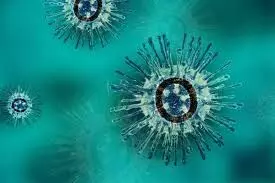
New study claims Omicron can survive 8 days on plastic, 21 hours on skin
text_fieldsTokyo: The omicron COVID-19 variant can remain alive on your skin for 21 hours and more than 8 days on plastic surfaces and that is why it might be 'highly infectious', a recent study reveals, as reported by Reuters.
In a lab experiment, samples of different variants were applied to pieces of plastic and human skin collected from autopsies, researchers from Kyoto Prefectural University of Medicine wrote in bioRxiv. A variant "survived" until it could no longer be detected on the surface.
The study posted on pre-print, and not peer-reviewed yet, analysed the differences in viral environmental stability between the SARS-CoV-2 Wuhan strain and all variants of concern (VOCs).
The findings showed that on plastic and skin surfaces, Alpha, Beta, Delta, and Omicron variants exhibited more than two-fold longer survival times than those of the Wuhan strain and maintained infectivity for more than 16 hours on the skin surfaces.
Omicron survived 21.1 hours on skin model from cadavers, followed by the Wuhan virus (8.6 hours), the Gamma (11 hours) and Delta (16.8 hours) variant.
The survival of Alpha (19.6 hours) and Beta (19.1 hours) was found to be similar.
"The Omicron variant has the highest environmental stability among VOCs," said researchers from the Kyoto Prefectural University of Medicine in Japan.
Further, the team found that Omicron can survive 193.5 hours (about 8 days) on a plastic (polystyrene) surface, plus three times that of the original strain (56 hours) and of the Gamma variant (59.3 hours), and significantly more than Delta (114 hours) and Beta (156.6 hours). Only the Alpha variant, with 191.3 hours, showed similar resistance.
The researchers said that the high environmental stability of these VOCs could increase the risk of contact transmission and contribute to the spread of VOCs.
The study also showed that although Alpha, Beta, Delta, and Omicron variants showed a slight increase in ethanol resistance, all VOCs on the skin surface were completely inactivated in 15 seconds exposure to alcohol-based hand sanitiser.























